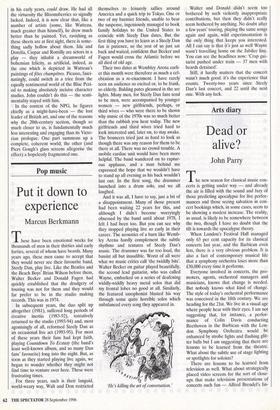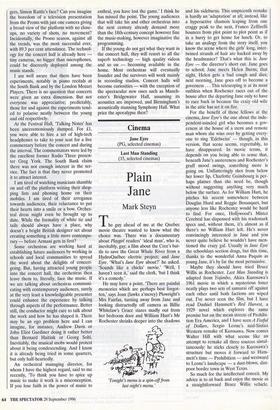Arts diary
Dead or alive?
John Parry
The new season for classical music con- certs is getting under way — and already the air is filled with the sound and fury of those predicting apocalypse for live perfor- mances and those seeing salvation in con- cert bookings which, in some cases, seem to be showing a modest increase. The reality, as usual, is likely to be somewhere between the two, though I have no doubt that the tilt is towards the apocalypse theory.
When London's Festival Hall managed only 63 per cent capacity for its classical concerts last year, and the Barbican even less, there is a very obvious problem. It is also a fact of contemporary musical life that a symphony orchestra loses more than £30,000 every time it performs.
Everyone involved in concerts, the pro- moters, agents, orchestral managers and musicians, knows that change is needed. But nobody knows what kind of change. The style of today's orchestral performance was conceived in the 18th century. We are heading for the 21st. We live in a visual age where people hear with their eyes. I am not suggesting that, for instance, a perfor- mance of Colin Davis conducting Beethoven in the Barbican with the Lon- don Symphony Orchestra would be enhanced by strobe lights and flashing glit- ter balls but I am suggesting that there are lessons to be learned from the theatre. What about the subtle use of stage lighting or spotlights for soloists?
There are lessons to be learned from television as well. What about strategically placed video screens for the sort of close- ups that make television presentations of concerts such fun — Alfred Brendel's fin- gers, Simon Rattle's face? Can you imagine the boredom of a television presentation from the Proms with just one camera giving a broad view of the platform with no close- ups, no variety of shots, no movement? Incidentally, the Proms season, against all the trends, was the most successful ever, with 89.3 per cent attendance. The technol- ogy for the concert hall is already here tiny cameras, no bigger than microphones, could be discreetly deployed among the music stands.
I am well aware that there have been experiments, notably in piano recitals at the South Bank and by the London Mozart Players. There is no question that concerts were given an extra dimension. But not everyone was appreciative; predictably, those for and against the experiments tend- ed to polarise neatly between the young and old respectively.
At the Festival Hall, `Talking Notes' has been unceremoniously dumped. For £1, you were able to hire a set of high-tech headphones to take to your seat for a live commentary before the concert and during the interval. The commentators were led by the excellent former Radio Three presen- ter Greg York. The South Bank claim there was not enough interest in the ser- vice. The fact is that they never promoted it to attract interest.
I am tired of watching musicians shamble on and off the platform writing their shop- ping lists and phoning home on their mobiles. I am tired of their arrogance towards audiences, their reluctance to put their hearts into a smile or a bow. Orches- tral dress might even be brought up to date. While the formality of white tie and tails should always have a place, why doesn't a bright British designer set about creating something a little more contempo- rary — before Armani gets in first?
Some orchestras are working hard at establishing future audiences by working in schools and local communities to spread the word about the delights of concert- going. But, having attracted young people into the concert hall, the orchestras then leave them to, literally, face the music. If we are talking about orchestras communi- cating with contemporary audiences, surely at the very least a knowledgeable presenter could enhance the experience by talking through aspects of the performance. Better still, the conductor might care to talk about the work and how he has shaped it. There may be an ego problem here and I can imagine, for instance, Andrew Davis or John Eliot Gardiner doing it rather better than Bernard Haitink or Georg Solti. Inevitably, the musical snobs would protest about it being condescending. And I know it is already being tried in some quarters, but only half-heartedly.
An orchestral managing director, for whom I have the highest regard, said to me recently, `To think you have to spice up music to make it work is a misconception. If you lose faith in the power of music to enthral, you have lost the game.' I think he has missed the point. The young audiences that will take his and other orchestras into the next century already demand more than the 18th-century concept however fine the music-making, however imaginative the programming.
If the young do not get what they want in the concert hall, they will resort to all the superb technology — high quality videos and so on — becoming available in the home. Most orchestras will eventually founder and the survivors will work mainly in recording studios. Concert halls will become curiosities — with the exception of the spectacular new ones such as Manch- ester's Bridgewater Hall, assuming its acoustics are improved, and Birmingham's acoustically stunning Symphony Hall. What price the apocalypse then?



















































































 Previous page
Previous page